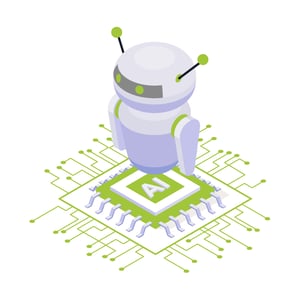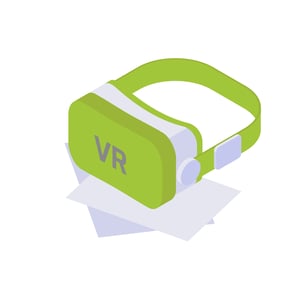Digitalisation refers to the process of converting business processes from manual or people-driven to digital. For example, in a customer service department where once a large group of customer service agents would have manned the phones. Digital chat bots may now handle the majority of customer service enquiries.
As the world becomes increasingly digital in all sectors and industries, the need for digitalisation in business is not just preferred but necessitated. Digital processes are quicker, more accurate and (in the long run) cheaper than their traditional manual forebears. Their ability to improve performance is enabling organisations to get ahead of their competitors.
2023 see’s some familiar digitalisation trends, but things are moving on and the way in which things such as AI can support businesses from small start-ups to large multinational corporations is like nothing we’ve seen in the past.
Read on to see our round up of the top 10 trends in digitalisation this year.
 Artificial Intelligence
Artificial Intelligence
AI made some giant leaps last year with businesses and individuals recognising first-hand examples of the potential uses. The groundbreaking Chat GPT launched giving everybody access to a plethora of possibilities. Need a personalised Personal Training programme or a business strategy? Just ask Chat GPT.
AI shines in business when it is used to automate repetitive, time-consuming business processes, giving employees more time to impact the business in other ways. In 2023 we will see the layering of AI and Machine Learning (ML). This will give the opportunity for AI to continuously improve and adapt. The more data the system has, the more insights it will uncover.
Super apps
Elon Musk, having just completed his purchase of Twitter, recently tweeted a series of cryptic slides referring to ‘The Everything app’ or simply ‘X’. This ‘go-to’ is said to combine social media with the payment-like capabilities of PayPal and a slick interface. This isn’t the first time we have heard of a world-dominating super app though. In 2011, Chinese tech giant WeChat launched and now boasts a messaging platform, payment system and mini third party applications. It is considered to be the operating system of the Chinese internet with 1.3 billion users.
Sustainable Tech
According to Rubicon, Sustainable technology “describes innovation that considers natural resources and fosters economic and social development.” Think electric buses, solar power and self-sufficient off-grid buildings. Sustainable tech can transform businesses and public sectors by reducing risk. Use of renewable and biodegradable materials will protect the environment and your business from the negative effects of climate change.
Environmental and Social Governance
The US Securities and Exchange Commision (SEC) published a proposal for climate-related disclosures in 2022, which businesses pored over in great detail. Their proposal would require all public companies to report their greenhouse gas emissions. The need for businesses to be transparent on their climate impact and for CEOs to be held to account for it is growing. But it’s not just the environment we should consider in digitalisation. Social governance considers the needs of your workers, the community and customers in business operations. Setting a framework that takes into account all of your stakeholders is vital in 2023.
Regulations in technology
With an increase in technology also comes the need to protect users and businesses from mis-use. The European Commission has a number of proposals to regulate AI including the AI Act and the AI Liability Directive. Data privacy remains high on the agenda of all regulators, but with development of biometric recognition systems and even the analysis of emotions, the complexity of how and what to regulate is challenging. Understanding how and what risks all technology poses this year will be the key to protecting businesses and individuals.
The Internet of Things
Tech Target reported that we will see a growth of Internet of Things devices by 18% in 2023 to 14.4 billion. And by 2025 this figure could have soared to 27 billion! The IoT refers to the physical objects that most of us use every day that are now online and capable of communicating with one another and with us. The rise of smart machinery in the workplace is starting to revolutionise the digitalisation of businesses. Supply chains are being optimised with the invention of this tech, and business operations are changing.
 Augmented Reality
Augmented Reality
We are starting to see an emergence of augmented in a variety of different industries including retail, business, gaming, healthcare and even the military to solve business challenges. You can step into the ‘metaverse’ and make your virtual meetings even more realistic with avatars representing you in video conference meetings. And if you’re looking to stand out from the crowd, how about an interactive business card or brochure using AR?
Robotics
Are we moving towards a world where robots will replace humans? In some industries, such as manufacturing, robots already play a huge role in completing repetitive tasks accurately and quickly. The integration of AI and robots will further enhance business operations with robots collecting, analysing and acting upon data in real time. An increase in the use of ‘cobots’ - collaborative robots containing advanced sensors to ensure behaviours around people - are also on the rise. These robots lift heavy materials and will help workers on production lines to ensure there is as little downtime as possible.
Digital Innovation Hubs
European Digital Innovation Hubs (EDIHs) are “one stop shops supporting companies to respond to digital challenges and become more competitive.” (According to the European Commission) These hubs are giving businesses access to technical expertise and allowing them to ‘test before they invest’ in expensive digitally transformative technologies. By the end of 2022 136 grants were expected to be signed and for these EDIHs to be operational.
Big Data
Big data has and will continue to appear in any digital-related trends report for some years now. Data is a driving factor in decision making regardless of whether it is business or personal. In 2023 we will see an increased focus on the quality of information and improved ethics and regulation of data collection. Leveraging more AI and ML will also be increasingly prevalent in 2023.
There are some key digital developments that we will see improving our business process in 2023, but more than this the convergence of a number of specific trends will really shake things up. Think AI meets AR meets robotics…
For more information on the benefits of digitalisation read our recent blog and take your business to 2023 and beyond.
